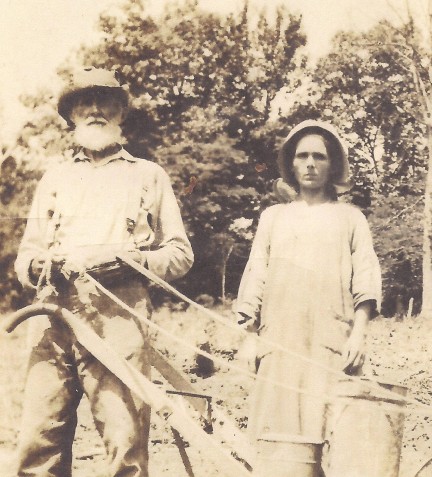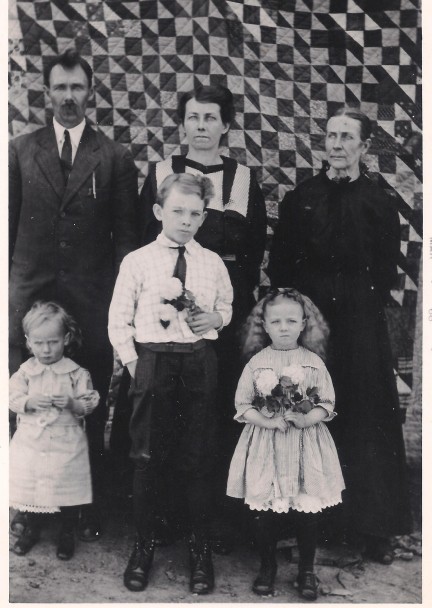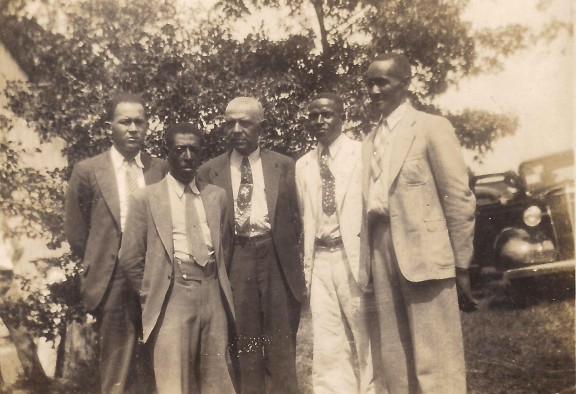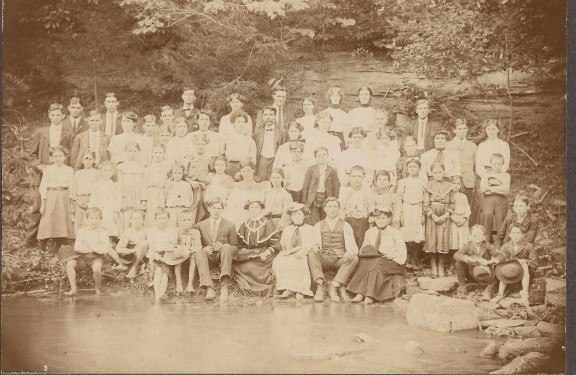It’s a story Will J. remembered hearing his Uncle Dewey Martin tell many times. The year was 1914 or 15, a time when the Open Fence Law was in place. Back then, folks around here didn’t have more than one or two cows, and since automobiles were practically unheard of, cows were pretty much free to roam. Paling fences were built to keep them out of the garden, and corn fields usually had split rail fences to keep the cattle out. The day Will J’s father, Roscoe Martin, discovered someone was taking down some of the rails to let their cows graze in his corn field, his brother, Dewey, decided to take matters into his own hands. He took a pistol Roscoe owned and went out to the corn field and shot one of the cows through her utter. Needless to say, this didn’t set well with the cow’s owner, and the case ended up in court. The owner of the cow charged Roscoe with the crime. Dewey was called to testify, and when he was asked by the judge if he saw Roscoe shoot the cow, he replied, "No, Roscoe didn’t shoot the cow, I did." Since Dewey hadn’t been charged, the judge had no choice but to dismiss the case. But the matter didn’t end there. The owner of the cow and several others who were either neighbors or relatives came to court that day in a wagon. Little did they know that sometime before they loaded into the wagon to head home, Dewey had loosened a tap that held one of the wagons wheels on. Not long into their journey back toward Taylors Crossroad, the wheel came off the wagon. Those who were riding on the wagon spent several hours going up and down the side of the road looking for the tap. They didn’t realize they were wasting their time due to the fact that Dewey had thrown it way. Dewey had ridden a horse to town that day, and unbeknown to the wagon travelers, was watching from a safe distance away. But he didn’t stick around to find out how those folks made it on home after spending a day in court that didn’t go too well, and to then having to deal with a broken down wagon on the way home.
Roscoe Martin and wife Annis Martin (whose maiden name was also Martin) made their home near Roadside, not far from the Independence and Taylors Crossroads communities. They were the parents of eight children whose names were Oscar; Louverna; Emmajene; Colbert; Paul; Will J.; Truman; and Cleo. Their daughter, Louverna, died as the result of burns she sustained was she was around two years old. Their son, Truman, who may have been born with a heart murmur, died in 1934 after having red measles and pneumonia. The Martin children got their education at Ozone, a school just down the road from their house.
Roscoe Martin’s father, Jacob J. (Jake) Martin, was well known for his excellent carpenter skills, something he handed down to Roscoe. Both men had a reputation for making fine furniture, things such as rocking chairs, straight back chairs, and a type of chair called a crook back chair. Spinning wheels, flax wheels, and even coffins were also crafted by their skilled hands. Long before Jake Martin and his son made chairs together, he and his wife Nancy Young Martin decided to relocate to the State of Missouri. They swapped their farm in the Independence community for a mule and a cart, loaded up their children and their worldly goods, and headed for Missouri. On the way, one of children became quite sick and died. They turned around and came back home, and a year or so later, made the trip again. Roscoe told the story later about laying eyes for the first time on the Mississippi River. He described that sight as the "awfulest lot of water he had ever seen!" They crossed the Mississippi by way of a ferry that was pulled across to the other side by a mule. The family stayed a year or so in Willow Springs, Missouri before returning once more to the Independence community where Jake and Nancy lived out the rest of their lives. They moved on the mountain at Oakley where a good supply of timber grew that Jake used in the furniture and chair making business.


Will J. recalled an incident that’s an excellent example of how families dealt with difficult situations back then that probably wouldn’t have the same result today. His brothers, Paul and Colbert, who were both on horseback, rode up behind a mule who kicked at the horse Paul was on. But it was Paul’s leg that received the kick from the mule, and by the time he got to the house, his foot on the leg the mule kicked was turned completely backward. Both bones in his leg had been broken. The boys’ Grandpa, Jake Martin, and their father, Roscoe, after setting the bones as best their could, made splits out of paling fencing. Then using domestic material and cotton to wrap up the splints, they tied everything up really good and tight. For the next six weeks, Paul wasn’t allowed to put any weight on that leg, and was carried to the table in a straight back chair for meals. His leg healed completely, and he walked without even the slightest limp. It was only years later when he was examined for the army that anyone could even tell he had ever suffered a broken leg, and then, it was by way of an x-ray.
Another trait Roscoe Martin and son Will J. were known for in the community was their ability to break horses and mules. In 1925, Roscoe received a certificate after completing a home study from Berry’s Horsemanship. He and Will J. were often called on to deal with the meanest and most stubborn of animals. A fellow named Elmo Langford had a pair of wild Persian horses shipped in, and no one could even catch them. But Roscoe and Will J. figured out how to do it. They placed a rope on the ground that they used to catch the foot of each horse as they ran by. They took the horses back to their farm, and after working with them for about six months, returned the horses to their owner with a much gentler and more workable attitude. Another mare owned by Shirley White in the Free Communion community had the reputation as being unbreakable. Will J. described this mare as being so stubborn she even refused to get up when someone built a fire close enough to burn a place on her side. This mare suffered through all kinds of terrible abuse, but was so stubborn, no matter how bad the treatment, she continued to sull and refused to cooperate. But that same mare was no problem for Will J. and his dad. A little water poured in her nose or in her ear was all it took. She cooperated fully for them.
Several grist mills were once operated in close proximity of each other around the Taylors Crossroads store, and one of those mills belonged to Roscoe Martin. He also operated a blacksmith shop near his grist mill where mules could be shod when the grist mill business wasn’t too busy. Will J. recalls that on Saturdays and Tuesdays, the days referred to as "grind days," it was nothing unusual for as many as 100 to 150 people to be around the store at Taylors Crossroads. The big coal burning stove in the store would be the gathering place in the winter months for swapping the news of the community. On those days, it took all the Coleman brothers and their dad to take care of the many customers there.
All day gospel singings were often held in churches while Will J. was growing up, and one occasion he especially remembers that was held at the Taylors Crossroads Presbyterian church. A black gospel group came there to sing. That was probably the one and only time such an event took place in that community. According to Will J., there was standing room only in the church, and even the yard outside the church was filled. That special group of singers sang for the crowd the entire day.


Sometimes on Sundays, Bush Taylor and wife Annie could be seen as well as heard driving through the community in their car playing records on a record player that Bush had wired speakers up to. The drive had to be a slow one, not only because of the rough road conditions, but to also avoid the needle skipping across the record. The Taylors used these Sunday drives as a good way to advertise their radio shop just off the square in Livingston.
When Will J. was around 20 years old, he and Marvin Rome bought their first two cars together. The first was a Model T they paid a total of $50.00 for. They later sold it to Herbert Taylor who drove for several years afterward. The second car was a 1934 Ford that Will J. later bought Marvin’s share of.
The fact that the United States dropped bombs on Japan kept Will J. from having to serve in the military. He had received his call to be examined at Fort Oglesthorp in 1945, the year World War II ended. He remembers seeing German prisoners doing the cooking at Fort Oglesthorp where he and six others traveled by bus for the examination. He was later called back to be examined once more at the beginning of the Korean War, but did not have to serve in that war either.
It was at a funeral held at St. John’s in the Lilly Dale community that Will J. met Jewell Cyphers, someone he married after a year or so of courting. On September 9, 1951, they drove to Byrdstown and were married there by a Justice of the Peace. As the years went by, three daughters were added to their family, Marietta, Wanda, and Marlene. But tragedy struck when Jewell was only 41 years old. After spending a day peeling apples she and Will J. had driven to Mullins Orchard in Byrdstown to buy, Jewell died suddenly from a brain hemorrhage. She left behind a husband to raise three little girls, age 11, 9, and 6. It was a difficult time to get through, but somehow the family managed.
For most of Will J’s adult life, he has been known as someone who was an expert when it came to television and radio repair work. For thirteen years, he was employed by Puckett’s Furniture where he repaired tvs and other electronic equipment. He also made house calls to repair televisions and radios for individuals. After working a few years in Cookeville doing electronic repairs, and then later working at Berkline, he says he really hasn’t retired, but is just not in the ranks of the employed anymore. He still works all the time, but mostly for himself. After recently undergoing heart surgery, he goes a little slower pace. Will J. is the only member of his family still living.
Will J’s niece, Frances Garrett, daughter of Emmajene and Garland Garrett, once wrote about her grandparents, Roscoe and Annis Martin. Here is just a paragraph from her memories: "Their homestead looked rundown and many would have called them poor, but what I remember was their wealth, because I saw how nature served them. They were wise in so many ways because they knew how to live in harmony with God’s creations. The land and the trees were there to be worked and they produced the things they needed. Their life seemed so simple, and to my childish eyes, it was not very exciting. It was not until years later that I realized what I had seen in them. They had taught me a lesson with their life that neither they nor I knew about at the time."